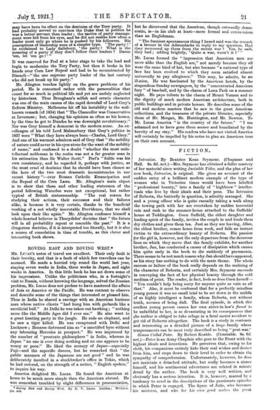ROVING EAST Al]) ROVING WEST.* Mn. Leces's notes of travel
are excellent. Their only fault is their brevity, and that is a fault of which few travellers can be accused. He made a hurried trip round the world last year, staying seven weeks in India, three weeks in Japan, and eight weeks in America. In this little book he has set down some of his impressions. Unlike the politicians who, in a fortnight's visit to Russia, without knowing the language, solved the Russian problem, Mr. Lucas does not profess to have mastered the affairs of Asia or America or the Pacific. He was content to observe and describe some of the things that interested or pleased him. Thus in India he shared a carriage with an American business man whose native clients "had hung him with garlands like a sacrificial bull." At Delhi he was taken out hawking ; "nothing mere like the Middle Ages did I ever see." He also went to a great hunting party in the jungle. He rode an elephant, and ho saw a tiger killed. He was enraptured with Delhi and
• L-ucknow ; Benares distressed him as "a sanctified byre without any labouring Hercules in prospect." He was impressed by the number of "prostrate philosophers" in India, whereas in Japan "no one is ever doing nothing and no one appears to be weary or .poor." He liked the scenery of Japan—especially Fuji—and the soporific dances, but he remarked that "the public manners of the Japanese are not good" and he was - deliberately insulted in a stockbroker's office in Tokio, which he had entered, on the strength of a notice, "English spoken,' to inquire his way.
. America delighted Mr. Lucas. He found the American at home to be much more simple than the American abroad. He was somewhat troubled by slight differences in pronunciation,
• Rasing East and Roving West By E. V. Lucas. London: Methuen. 1.58. net but he discovered that the American, though outwardly demo- cratic, is—in his club at least—more formal and ceremonious than an Englishman.
"The funniest spontaneous thing I heard said was the remark of a farmer in the Adirondack& in reply to my question, Had they recovered up there from the recent war ? Yes, he saki, they had ; adding brightly, 'Quite a war, wasn't it ? ' "
Mr. Lucas formed the "impression that American men are more alike than the English are," not merely because they all wear the same kind of hat, but also because "a national type of face has been evolved to which they seem satisfied almost universally to pay allegiance." This may, he admits, be an illusion. He was fascinated by the American hotels, by the stupendous Sunday newspapers, by the "concentrated American fury" of baseball, and by the charm of Lima Park on a summer night. He pays tribute to the charm of Mount Vernon and to the dignity of much modern American architecture, both in public buildings and in private houses. He describes some of the old and modern masters that he saw in the great American collections, and the treasures of the private libraries, especially those of Mr. Morgan, Mr. Huntington, and Mr. Newton. To
Mr. Lucas America "is the country of the future." "I am ashamed not to have gone there sooner and humiliated by the brevity of my stay." His readers who have not visited America will certainly be impelled by his notes to plan an American tour on their own account.










































 Previous page
Previous page